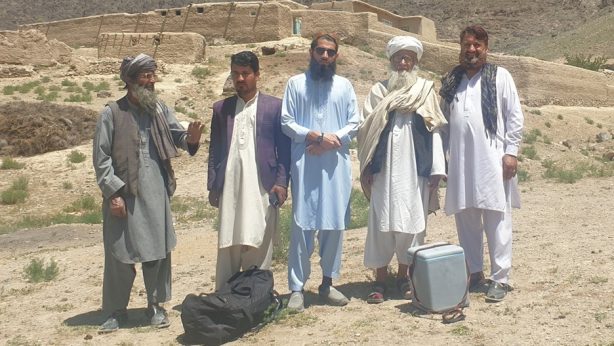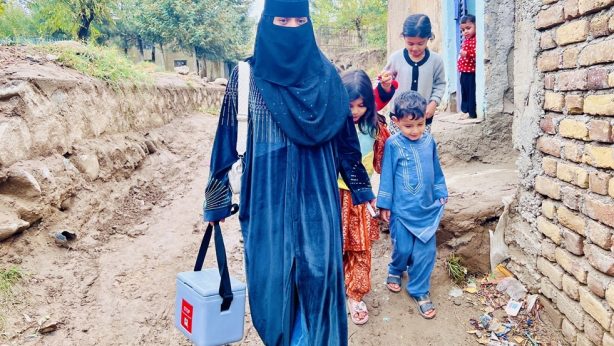The active role of female vaccinators in the polio vaccination campaigns in Herat

Marzia Frotan
Herat, Afghanistan: Salima Rasuli, the 18-year-old female vaccinator knocks on the red color door of a house in Herat city and asks the parents to bring their children outside for two-drop of polio vaccine.
The vaccinator is wearing a black dress, a blue scarf, and a black mask while carrying the vaccine carrier box. She follows children from street to street to ensure they don’t miss from polio vaccination.
Salima’s wants to ensure that no child in the areas under her responsibility is deprived of the polio vaccine.
She said, “I myself have small sister and brother. I consider every child as my brother and sister. I visit homes and vaccinate all children under the age of five. If a child absent and somewhere with the family, I re-visit the house to ensure all absent children receive polio vaccine.”
She reiterates the importance of vaccines and does not want poliovirus to attack any child.
She expressed, “If a child misses the polio vaccine, it threatens the lives of all the children in the community. In the areas under my responsibility, no child should miss from polio vaccine and I visit repeatedly visit the houses. I vaccinate the children in any way possible.”
According to Rasooli, some families refuse to vaccinate their children. However, she and her colleagues engage in conversations with the elders of the refusal families to persuade them to vaccinate their children under the age of five.
She says that some men and women from certain families refuse to vaccinate their children and are threatening her and her colleagues.
The residents of Herat welcome and appreciate the efforts of female vaccinators.
A 55-year-old Halimah, who is the grandmother of three children, brought her grandchildren to the front of the house, where they were given two drops of polio vaccine by female vaccinators.
She said that she is more comfortable with female vaccinators comparing to male vaccinators. The female members of families can comfortability communicate with the female vaccinators and they are allowed to enter to the houses to vaccinate children.
She added, “It is not easy to talk to male vaccinators, nor we can bring the children to them for vaccination because the men of our house do not allow female to speak with male vaccinators. However, we have no problem with female vaccinators.”
She mentioned, “I am happy that female vaccinators vaccinate my grandchildren in every polio vaccination campaign. The polio vaccine protects our children from polio disease and disability, and ensures their bight future.”
She urged that all mothers must vaccinate their children during each campaign to protect them from the perilous polio disease.
The Public Health Directorate of Herat reports that 95 percent of the polio vaccinators in all polio vaccination campaigns are female in Herat city.
Dr. Muhammad Asif Kabir, the deputy director of this directorate, stated that 1,100 female vaccinators are actively working in Herat province. The significant contribution of women is crucial for achieving 100 percent implementation of the polio vaccination campaign in this province.
“In the districts and remote areas, the polio vaccination campaign is conducted by male vaccinators. However, in Herat city, female vaccinators perform this task proficiently, as they can visit the houses and easily vaccinate sick and new born children,” She indicated.
Dr. Kabir explained that female vaccinators have helped to the house-to-house modality. The number of female vaccinators was low in the past; this resulted in some children being left unvaccinated due to social restrictions and family prohibitions.
He further added that in addition to social challenges and restrictions, female vaccinators perform their duties with good will and motivation.
A few weeks ago, a national polio vaccination campaign conducted, in which 1.25 million children were vaccinated in the western zone, including Herat province. The children aged 24-59 months also received Mebendazole tablets, which treats infections caused by worms.





